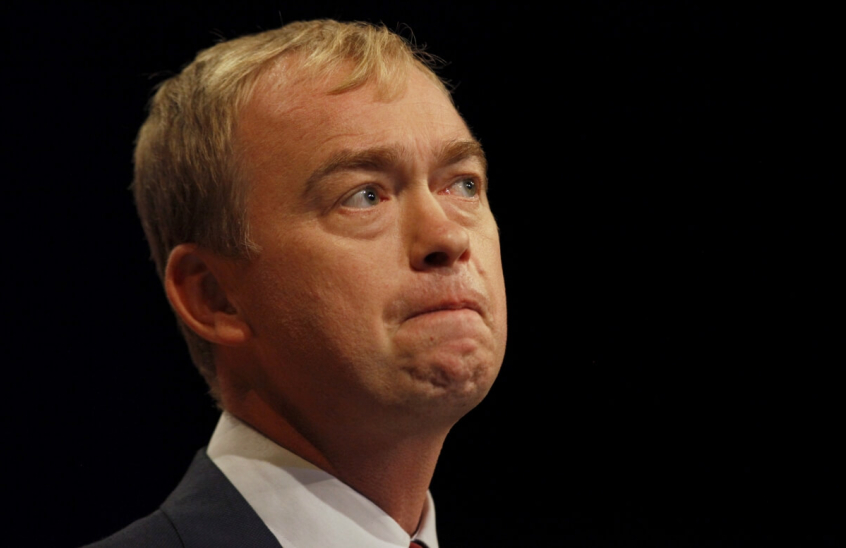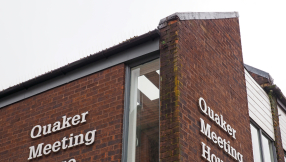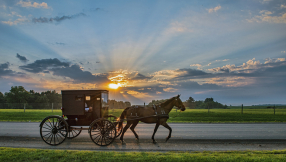
Amid all the cross-party fighting that will go on at Westminster during this extended general election campaign, there is a stark consensus among all the major parties on one area of policy: human sexuality.
This blanket social liberalism was demonstrated last night when, for better or worse, it finally swallowed up Tim Farron, the leader of the Liberal Democrats and an evangelical Christian. After several years of dodging the question posed by broadcasters of whether gay sex is a sin, choosing the formula that 'we are all sinners,' Farron sought to draw a line under the troubling line of questioning on the BBC's PM programme by saying 'I don't believe gay sex is a sin'.
The change of position, aimed at giving Farron a clear run at what he hopes will be a revival of his party's fortunes based on its clear opposition to a 'hard' Brexit, was that rare thing in Westminster: a U-turn which did not result in uproar. For by conceding ground to the socially liberal position, Farron was falling into line with a consensus that today sees the former Conservative leader David Cameron name gay marriage as the prime ministerial achievement of which he is most proud. Indeed, it was gay rights and gay rights alone that awarded Cameron the priceless media title 'moderniser' in the run-up to the 2010 general election, despite leaving his party unreconstructed on the major issues of the day, from the economy to immigration to, as we have discovered, Europe.
On sex and sexuality, the media and politicians are unusually united: it is not just Channel 4's Cathy Newman, who first asked Farron the question in 2015, the BBC Radio 4's Today programme's John Humphries, who was accused of 'sneering' questions about faith early on in Farron's leadership, or Radio 4's PM programme which may have resolved the issue last night.
It's MPs, too: Farron was asked whether being gay was a sin by the (gay) Tory MP Nigel Evans in the House of Commons, and then jointly condemned by another Conservative, Michael Gove, and the Labour MP Liz Kendall on ITV's Peston programme on Sunday. Gove and Kendall may fundamentally disagree on the issue that is defining this election so-far – Brexit – but they agreed that Farron could, and should have 'closed down' the gay sex debate by saying that it was not a sin.
And it is the very concept of sin, that seems to cause such outrage inside an ever-increasingly secular Westminster village.
At least Gove has a healthy understanding of the Christian belief that everyone is indeed a sinner, as was evident when he told me in February: 'I am a sinner and I know it profoundly.' But to some in the media, that was enough to make headline news, with one paper dubbing it on its front page 'The confession of Michael Gove'.
Indeed, when Carolyn Quinn, who presents PM and is one of the best broadcasters in political journalism, turned to my colleague Harry Farley last night after Farron's climbdown and asked him point-blank if gay sex was a sin, Farley could be forgiven for having thought that he'd been thrown to the Westminster lions. Instead, he calmly explained, among other things, the distinction between 'inclination' and acting on that inclination.
To be fair to this consensus for a moment, it may be that the Lib Dem leader is being picked on, as opposed to, say, the high Anglican Theresa May, because he is by definition meant to be leading the 'Liberal' movement in this country.
And yet this too arguably shows a misunderstanding of liberalism, which after all is about incorporating differing viewpoints. Is overt Christianity becoming a viewpoint too far when it comes to leading a centre-left party? Is this what what Alastair Campbell was afraid of when he famously interrupted an American journalist interviewing Tony Blair and said 'We don't do God'?
In a little known fact, the late Charles Kennedy was a practising Catholic, but his leadership of the Lib Dems was defined by his opposition to the 2003 invasion of Iraq, just as Farron hopes his will be by Brexit opposition. Whether a Catholic could lead a major party now, remains to be seen.
For there appears to be a fresh intolerance towards private faith among top politicians, even if it is somehow 'compartmentalised' by that politician away from the politics, as appears to be the case with Farron. His voting record, after all, is far more consistently progressive on gay rights than that of Theresa May. Perhaps May will now face the gay sex question during this campaign, much to her bemusement.
But there are other inconsistencies here. May travels to and promotes the UK's relationship with Saudi Arabia, where gays are tormented and killed. Likewise in Iran, where Press TV welcomes the Labour leader Jeremy Corbyn.
However, perhaps the greatest misunderstanding of all in Westminster is over the Christian agenda itself. Compared to gay sex, the churches in this country are surely far more concerned with foreign aid, which the former Archbishop of Canterbury Rowan Williams influentially urged May to retain last week, with food banks, with the destitute.
And as Christian Today reported last week, recent statistics show a fundamental disconnect between the agenda of Christian voters and Westminster.
While the socially liberal media and political pack obsesses over immigration and Europe, the Christian electorate is more concerned with poverty and climate change.
To be fair to the bumbling Farron, his politics are more in tune with these truly liberal priorities than the other party leaders, which may help explain why his party fairs disproportionately well among Christian voters.
My guess is that outside the Westminster village, the wider electorate do not much care about Farron's private views on gay sex, whatever they really are. And Farron may yet revive the fortunes of a party that seemed finished only a year ago. In other words, when it comes to the gay sex row, having played the Westminster game on the PM programme last night, he may – just – get away with it.
But after this experience, it is surely more unlikely that the Lib Dems will ever be led by an evangelical Christian again.
And that strikes me as illiberal.









